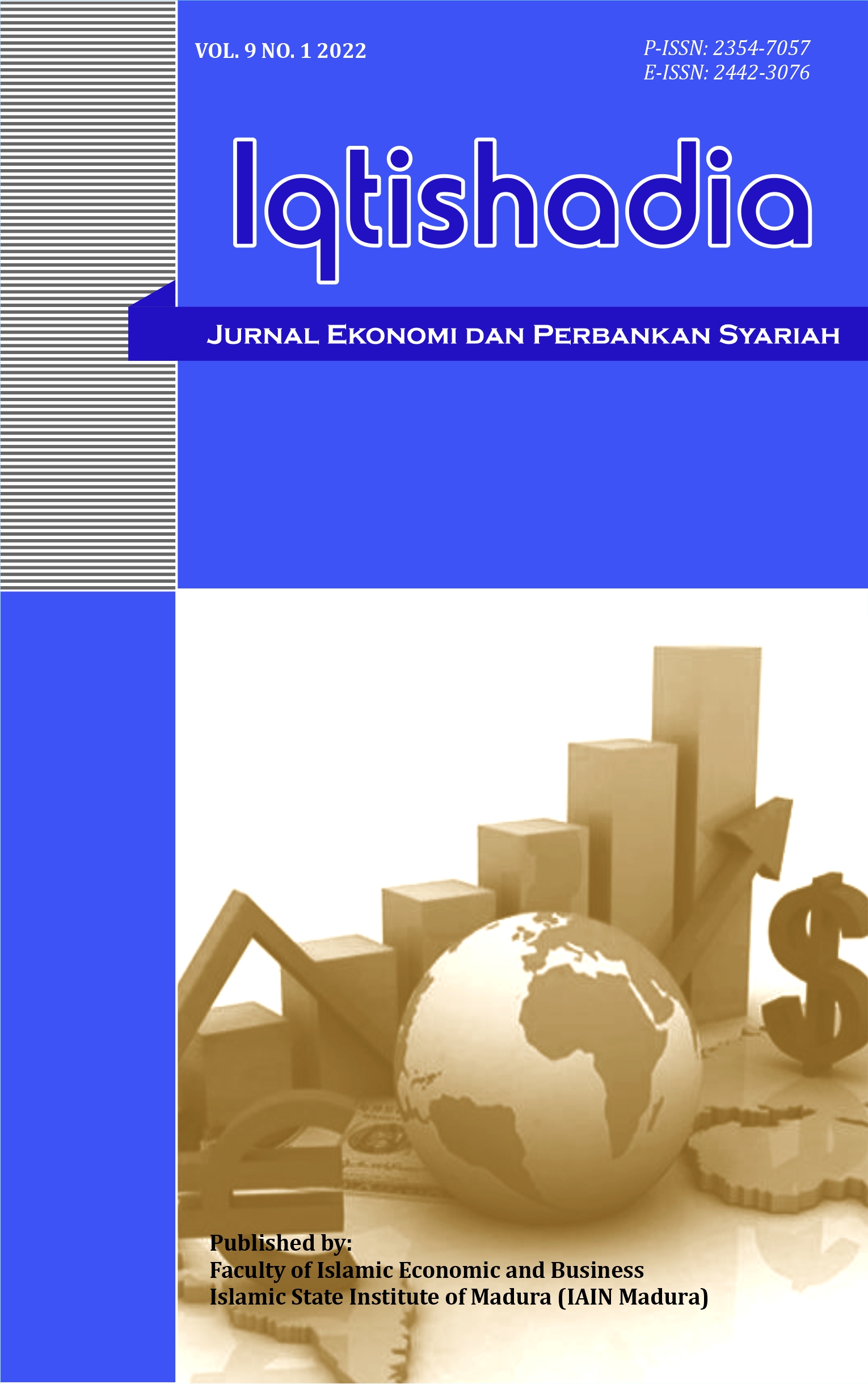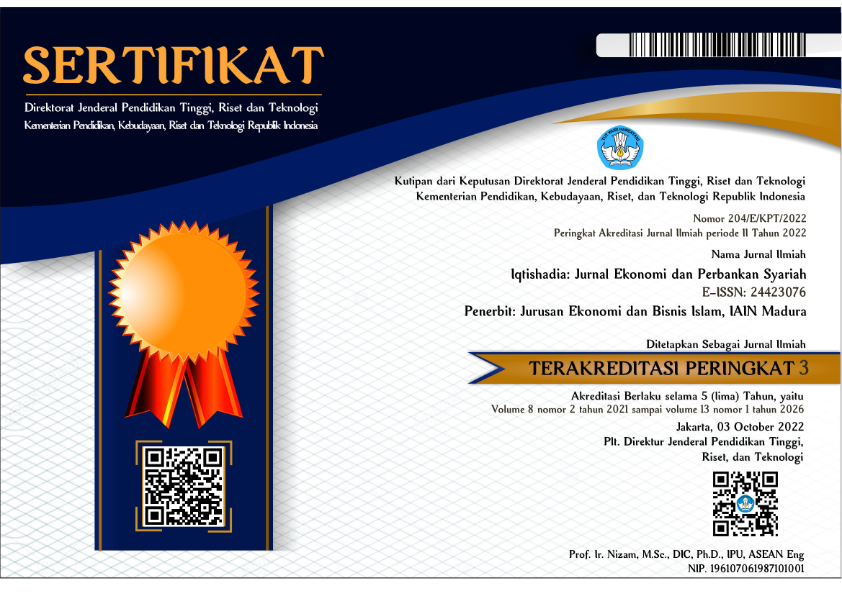Tingkat Kepatuhan Syariah Bank Pembiayaan Rakyat Syariah Berbasis Maqashid Syariah
 Abstract views: 742
,
Abstract views: 742
,
 PDF downloads: 795
PDF downloads: 795
Abstract
Knowledge of shariah compliance in the sharia banking industry is still low. Shariah compliance is a special uniqueness that exists in sharia banking. The correct knowledge of shariah compliance has an important urgency in the operations of Islamic banks. The purpose of this study was to determine the level of sharia compliance of Islamic Rural Banks in Indonesia. The research method uses a quantitative descriptive approach. The data source of this research is secondary data. The data collection technique uses documentation in the form of annual reports of all Sharia Rural Banks (BPRS) which are the combined financial statements of BPRS in the Sharia Banking Statistics Report for September 2021 Otoritas Jasa Keuangan (OJK) with a total of 165 BPRS. The results show that the level of sharia compliance of Islamic Rural Banks (BPRS) as measured by the Maqashid Shariah Index (MSI) for a period of 10 years is still very low with an average index value of 0.32319 or 32.319%. Research findings reveal that the allocation of funds to aspects of education, research and training as well as the ratio of zakat to income is very relatively low, even information related to zakat payments until 2018 is non-existent or zero. The results of this study can be used as input for the management of Islamic Rural Banks (BPRS) special attention to the dimensions of which the index value is still very low
Downloads
References
Asutay, M., and A.F Harningtyas. ‘Developing Maqasid Al-Shari’ah Index to Evaluate Social Performance of Islamic Banks: A Conceptual and Empirical Attempt’. International Journal of Islamic Economics and Finance Studies 1, no. 1 (2015): 5–64.
Basiruddin, Rohaida, and Habib Ahmed. ‘Corporate Governance and Shariah Non-Compliant Risk in Islamic Banks: Evidence from Southeast Asia’. Corporate Governance (Bingley) 20, no. 2 (2020): 240–62. https://doi.org/10.1108/CG-05-2019-0138.
Bedoui, Houssem Eddine, and Walid Mansour. ‘Performance and Maqasid Al-Shari’ah’s Pentagon-Shaped Ethical Measurement’. Science and Engineering Ethics 21, no. 3 (2015): 555–76. https://doi.org/10.1007/s11948-014-9561-9.
Hamid, Wahyuniati, Ubud Salim, Djumahir, and Siti Aisjah. ‘The Effect of Al-Bai’ and Wadiah Contracts on Sharia Compliance and the Sharia Banking System Performance through the Maqashid Index in Sharia Banks in Indonesia’. Banks and Bank Systems, 2019. https://doi.org/10.21511/bbs.14(4).2019.10.
Hudaefi, Fahmi Ali, and Kamaruzaman Noordin. ‘Artikel - Harmonizing and Constructing an Integrated Maqasid Al-Sharīʿah Index.Pdf’. ISRA International Journal of Islamic Finance 11, no. 2 (2019): 282–302. https://doi.org/https://doi.org/10.1108/IJIF-01-2018-0003.
Kholid, Muamar Nur, and Arief Bachtiar. ‘Good Corporate Governance Dan Kinerja Maqasid Syariah Bank Syariah Di Indonesia’. Jurnal Akuntansi & Auditing Indonesia 19, no. 2 (2015): 126–36. https://doi.org/10.20885/jaai.vol19.iss2.art4.
Latif, Abdul. ‘Tehnik Pengawasan Kualitas Kepatuhan Syariah (Sharia Complaince)’. Jurnal Ekonomi Islam 10, no. 1 (2018): 89–108.
Meutia, Inten, Mohammad Adam, and Rulyanti Susi Wardhani. ‘Do Sharia Compliance Affect Islamic Banks Performance? Evidence from Islamic Banks in Indonesia’. Journal of Emerging Economies and Islamic Research 7, no. 3 (2019): 12. https://doi.org/10.24191/jeeir.v7i3.6203.
Mohammed, M.O., D. Abdul Razak, and F. Md Taib. ‘The Performance Measures of Islamic Banking Based on the Maqasid Framework’. The IIUM International Accounting Conference (INTAC IV). Malaysia, 2008.
Muhammad, Rifqi, and Hapsari Yuni Oktaviyanti. ‘Dampak Tata Kelola Bank Syariah Terhadap Kepatuhan Syariah Berbasis Maqashid Syariah’. Wahana: Jurnal Ekonomi, Manajemen Dan Akuntansi 23, no. 2 (2020): 239–59. https://doi.org/10.35591/wahana.v23i2.188.
Otoritas Jasa Keuangan. ‘Peraturan Otoritas Jasa Keuangan No 24/POJK:03/2018 Tentang Penerapan Tata Kelola Bagi Bank Pembiayaan Rakyat Syariah’. OJK, 2018.
———. POJK Nomor 46/POJK.03/2017 Tentang Pelaksanaan Fungsi Kepatuhan Bank Umum, OJK (2017).
———. ‘Snapshot Perbankan Syariah September 2021’, 2021.
Setyowati, Ro’fah, Bagas Heradhyaksa, and Ismail Suardi Wekke. ‘Sharia Compliance in the Islamic Banking Percepetion in Indonesia’. International Journal of Innovation, Creativity and Change 5, no. 2 (2019): 1608–20.
Usman, Hardius, Nucke Widowati Kusumo Projo, Chairy Chairy, and Marissa Grace Haque. ‘The Exploration Role of Sharia Compliance in Technology Acceptance Model for E-Banking (Case: Islamic Bank in Indonesia)’. Journal of Islamic Marketing, 2021. https://doi.org/10.1108/JIMA-08-2020-0230.
The journal operates an Open Access policy under a Creative Commons Non-Commercial Share-Alike license. All articles published Open Access will be immediately and permanently free for everyone to read and download.
• Creative Commons Attribution-NonCommercial (CC-BY-NC)

Iqtishadia: Jurnal Ekonomi dan Perbankan Syariah by http://ejournal.iainmadura.ac.id/index.php/iqtishadia is licensed under a Creative Commons Attribution-NonCommercial 4.0 International License.
Based on a work at http://ejournal.iainmadura.ac.id.


























